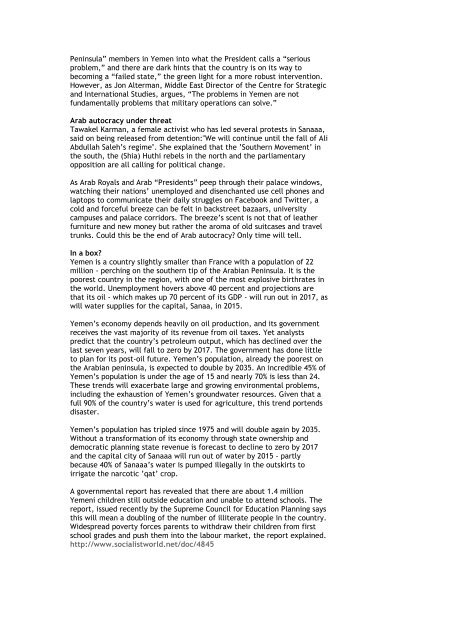April 2011 - Centre for Civil Society - University of KwaZulu-Natal
April 2011 - Centre for Civil Society - University of KwaZulu-Natal
April 2011 - Centre for Civil Society - University of KwaZulu-Natal
You also want an ePaper? Increase the reach of your titles
YUMPU automatically turns print PDFs into web optimized ePapers that Google loves.
Peninsula” members in Yemen into what the President calls a “serious<br />
problem,” and there are dark hints that the country is on its way to<br />
becoming a “failed state,” the green light <strong>for</strong> a more robust intervention.<br />
However, as Jon Alterman, Middle East Director <strong>of</strong> the <strong>Centre</strong> <strong>for</strong> Strategic<br />
and International Studies, argues, “The problems in Yemen are not<br />
fundamentally problems that military operations can solve.”<br />
Arab autocracy under threat<br />
Tawakel Karman, a female activist who has led several protests in Sanaaa,<br />
said on being released from detention:"We will continue until the fall <strong>of</strong> Ali<br />
Abdullah Saleh’s regime". She explained that the ’Southern Movement’ in<br />
the south, the (Shia) Huthi rebels in the north and the parliamentary<br />
opposition are all calling <strong>for</strong> political change.<br />
As Arab Royals and Arab “Presidents” peep through their palace windows,<br />
watching their nations’ unemployed and disenchanted use cell phones and<br />
laptops to communicate their daily struggles on Facebook and Twitter, a<br />
cold and <strong>for</strong>ceful breeze can be felt in backstreet bazaars, university<br />
campuses and palace corridors. The breeze’s scent is not that <strong>of</strong> leather<br />
furniture and new money but rather the aroma <strong>of</strong> old suitcases and travel<br />
trunks. Could this be the end <strong>of</strong> Arab autocracy? Only time will tell.<br />
In a box?<br />
Yemen is a country slightly smaller than France with a population <strong>of</strong> 22<br />
million - perching on the southern tip <strong>of</strong> the Arabian Peninsula. It is the<br />
poorest country in the region, with one <strong>of</strong> the most explosive birthrates in<br />
the world. Unemployment hovers above 40 percent and projections are<br />
that its oil - which makes up 70 percent <strong>of</strong> its GDP - will run out in 2017, as<br />
will water supplies <strong>for</strong> the capital, Sanaa, in 2015.<br />
Yemen’s economy depends heavily on oil production, and its government<br />
receives the vast majority <strong>of</strong> its revenue from oil taxes. Yet analysts<br />
predict that the country’s petroleum output, which has declined over the<br />
last seven years, will fall to zero by 2017. The government has done little<br />
to plan <strong>for</strong> its post-oil future. Yemen’s population, already the poorest on<br />
the Arabian peninsula, is expected to double by 2035. An incredible 45% <strong>of</strong><br />
Yemen’s population is under the age <strong>of</strong> 15 and nearly 70% is less than 24.<br />
These trends will exacerbate large and growing environmental problems,<br />
including the exhaustion <strong>of</strong> Yemen’s groundwater resources. Given that a<br />
full 90% <strong>of</strong> the country’s water is used <strong>for</strong> agriculture, this trend portends<br />
disaster.<br />
Yemen’s population has tripled since 1975 and will double again by 2035.<br />
Without a trans<strong>for</strong>mation <strong>of</strong> its economy through state ownership and<br />
democratic planning state revenue is <strong>for</strong>ecast to decline to zero by 2017<br />
and the capital city <strong>of</strong> Sanaaa will run out <strong>of</strong> water by 2015 - partly<br />
because 40% <strong>of</strong> Sanaaa’s water is pumped illegally in the outskirts to<br />
irrigate the narcotic ’qat’ crop.<br />
A governmental report has revealed that there are about 1.4 million<br />
Yemeni children still outside education and unable to attend schools. The<br />
report, issued recently by the Supreme Council <strong>for</strong> Education Planning says<br />
this will mean a doubling <strong>of</strong> the number <strong>of</strong> illiterate people in the country.<br />
Widespread poverty <strong>for</strong>ces parents to withdraw their children from first<br />
school grades and push them into the labour market, the report explained.<br />
http://www.socialistworld.net/doc/4845
















